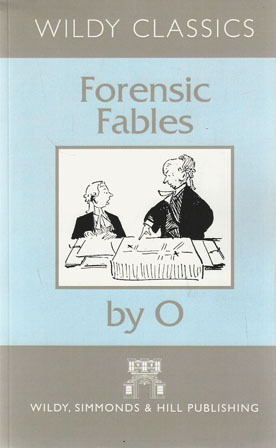
Forensic Fables appeared first in the Law Journal and then in book form between 1926 and 1932. They were published anonymously, but their authorship was quickly guessed.
The literary style and the pictorial delineation were alike unmistakable. They were the work of Theo Mathew composed in his study on the ground floor at the back of 31 Cornwall Gardens. They show his wit in all its maturity
Theobald Mathew was born in 1866, (died 1939), the elder son of Lord Justice Mathew. Educated at the Oratory School and Trinity College, Oxford he was called to the bar in 189O and practiced in the South-Eastern Circuit and in London. He established a substantial common law practice and was frequently briefed in commercial cases. In later years he specialised increasingly in libel.
He was the author of The Practice of the Commercial Court and for some years was Editor of Commercial Cases. Recorder of Margate from 1913 to 1927 and of Maidstone from 1927 to 1936, Theo Mathew was a Bencher of Lincoln’s Inn and was due to become Treasurer when he died in the summer of 1939.
Throughout his life, in addition to his legal work, he found time to write articles literary and historical, mainly with a legal flavour. He was widely recognised as the wittiest member of the Bar, his style lighter than his father's and with a perfect spontaneity He had a delightful sense of the ridiculous and had a merciless eye for the pretentious. Nor was his wit limited to legal subjects; he admitted once, very reluctantly, that he was responsible for the famous ‘Dr. Livingstone, I presume?’ story.
Theo Mathew had a deep respect for the traditions of his profession and great affection for so many of those who practised it. This book is evidence of both.
In 1949, Patrick Hastings dedicated his book Cases in Court to Matthew:-
If from the many figures that I know so well there is one who stands out among them all, it is one who was known to few people outside his own profession, but loved by everyone within it; "a fellow of infinite jest" with a mind that saw humour in everything, and a heart that held sympathy for everyone.
I can see him now strolling through his beloved Temple, where he loved to saunter, perhaps arm-in-arm with a distinguished judge, commiserating with him upon the stupidity of the junior Bar, or else sympathising with a member of the selfsame Bar upon the stupidity of judges. No one was too highly placed to be safe from criticism, no one was too lowly for his friendship and encouragement; many a pompom: silk has been chastened and subdued by his caustic comments; many a quivering junior has been uplifted by his kindly smile. He knew when sorrow was so real that it could best be shared in silence; when troubles were so imaginary that they could best be laughed away. He had done both to me.
"My dear Pat," he once greeted me, "you look harassed and depressed. Doubtless you must have heard of the conflagration in the chambers of Spitting Joe." Spitting Joe was a member of the Bar gifted with great enthusiasm but defective teeth, so much so that his opponents were invariably bespattered with moisture when he addressed them. "But be of good cheer. This danger is past. Spitting Joe himself was quickly on the scene, and with a few well-chosen words rapidly extinguished the flames."
Perhaps Theo Mathew did not achieve the great success of others I could name, but then he did not want success; he was a glorious companion, and will be remembered long after many of his more famous contemporaries are forgotten. To me he will remain for ever as a living picture of all I have loved best at the Bar.